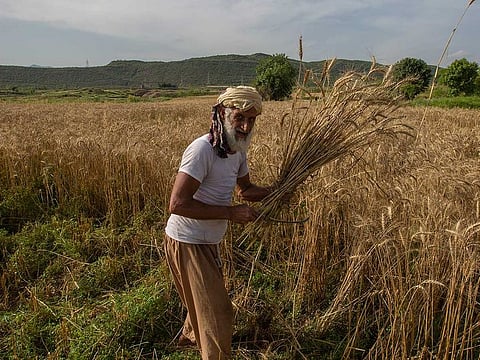Pakistan to empower farmers with interest-free loans and limiting role of middlemen
Curtailing the role of middlemen will enable farmers to get higher returns: Minister

Islamabad: The Pakistan government aims to empower farmers by offering them interest-free loans and curbing the role of middlemen as part of agriculture reforms.
The reforms are aimed at paving the way towards sustainable farming by offering easy loans to the small farmers in an attempt to “transform the agricultural sector and end exploitation by the middlemen.” A multidimensional approach has been suggested to streamline agro-industry and to build commodity warehouses and cold storage facilities for farmers across the country.
Influential role of middlemen
“The dominance of middlemen needs to be curtailed effectively. By eliminating the role of middlemen, the growers would get 35 to 40 per cent higher return of their agricultural produce,” said Finance Minister Shaukat Tarin. The role of middlemen was the focus of discussion at the meeting chaired by the finance minister to review the existing farm gate price mechanism and the obstacles faced by the farmers in transporting the perishable commodities to the nearest market.
In Pakistan, farmers are not directly connected to big buyers and industries. Instead, they rely on middlemen who purchase their harvest, acting as the sole custodian of both the farmers and the purchaser. This indirect system often puts the farmers at the risk of being exploited.
Aamer Hayat Bhandara, a middle-class farmer from Pakpattan district in Punjab province, says the “role of middlemen in farming is crucial but can be disastrous if it remains unchecked.” Commenting on the debate on excluding middlemen, Aamer told Gulf News that “middlemen have been playing an influential role in Pakistan’s agriculture industry for decades, acting on behalf of farmers who have no access to markets.”
He believes that the “government should limit the role of middlemen instead of excluding them from the industry” when there is little awareness or opportunities for farmers regarding the sale and purchase of agricultural produce. He suggested “setting up a board of directors supervised by the government with equal representation of farmers, traders, government officials, importers and exporters, farming experts” for inclusive development of the farming sector. The young farmer said that the people who bring food on our table must also share the policy-making table along with researchers, experts and officials.
Subsidies for farm inputs (quality seeds, fertiliser, pesticides and other best practices) are beneficial for farmers and critical to boost agricultural productivity and economic growth. “As a farmer, my biggest concern is how to improve the yield and maintain water efficiency and this is where we need government’s focus” Aamer insisted.
Support for farmers
Last month, Prime Minister Imran Khan launched Kisan Cards for farmers, which he termed a significant step towards modern agriculture. The cards would provide support to around 4 to 5 million farmers in the country by granting them easy loans, subsidies for seeds and pesticides, and financial support during natural disasters and crisis situations. “The more we strengthen our farmers, the more we will strengthen our country,” the premier said, describing the farmer community as the “backbone of Pakistan”.
Agriculture is the main source of livelihood for most of the rural population, which constitutes 60 per cent of the country’s total population, according to 2017 census. Farming is the mainstay of Pakistan’s economy, contributing 19 per cent to the country’s GDP and employing around 39 per cent of the labour force. Major crops (cotton, wheat, rice, maize and sugar cane) contribute 4 per cent and minor crops add 2 per cent to GDP while the livestock sector adds 11 per cent to GDP, according to official stats.
Sign up for the Daily Briefing
Get the latest news and updates straight to your inbox








